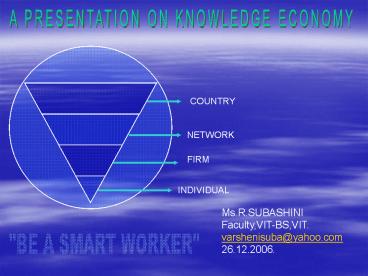A PRESENTATION ON KNOWLEDGE ECONOMY - PowerPoint PPT Presentation
1 / 25
Title:
A PRESENTATION ON KNOWLEDGE ECONOMY
Description:
3.2--- India's position in the global knowledge economy -comparison. ... Identify Commercial opportunities. -Aspiring Entrepreneurs Checklist- Here we go. ... – PowerPoint PPT presentation
Number of Views:81
Avg rating:3.0/5.0
Title: A PRESENTATION ON KNOWLEDGE ECONOMY
1
A PRESENTATION ON KNOWLEDGE ECONOMY
COUNTRY
NETWORK
FIRM
INDIVIDUAL
- Ms.R.SUBASHINI
- Faculty,VIT-BS,VIT.
- varshenisuba_at_yahoo.com
- 26.12.2006.
"BE A SMART WORKER"
2
PART-1
1.1--- Data,Information,Knowledge,Wisdom-? 1.2---
Why Knowledge Management? 1.3--- Types of
Knowledge.
3
PART-2
2.1--- 3 Basic steps in the knowledge
process. 2.2--- Business Knowledge.
4
PART-3
3.1--- Knowledge Economy its Pillars. 3.2---
Indias position in the global knowledge
economy -comparison. 3.3--- SWOT
analysis-India the knowledge economy.
5
Part-4
4.1--- The Real treasure-Intellectual
capital. 4.2--- How to become a knowledge
entrepreneur. 4.3--- Focus on a CASE. India
as a knowledge economyAspirations Vs Reality.
6
DATA,INFORMATION,KNOWLEDGE,WISDOM-?
Heuristic
WISDOM
Fluid mix Of Experience
KNOWLEDGE
PROCESSED DATA
INFORMATION
DATA
RAW DATA
Algorithmic
7
Why Knowledge Management?
What's knowledge management?
Management of organizational knowledge for
creating business value and Generating a
competitive advantage
--- Creating delivering innovative products and
services. --- Managing enhancing relationships
with stake holders --- Improving work practices.
8
Why Knowledge Management?
Why Knowledge management?
--- Companies are becoming knowledge intensive,
not capital intensive. --- KM lets U lead
change, so change does not lead u. --- Only the
knowledgeable survive succeed. --- Tacit
knowledge is mobile-KM saves your company. ---
Organized abandonment.
9
Types of Knoweledge
Types of Knowledge
--- Shallow knowledge (.) --- knowledge as
know- How ( ) --- Reasoning () --- Common
sense(!) --- Tacit knowledge (
) --- Explicit knowledge( )
10
BASIC STEPS IN THE KNOWLEDGE PROCESS
TECHNOLOGY SUPPORT
11
BUSINESS KNOWLEDGE
-Leveraged Core Competencies E.g.
CANON. -Continuous improvement of the value
added chain E.g.- VIT,
WAL-MART. -Ability to fundamentally revitalize.
E.g.-BARNES NOBLE -Increasing
Returns E.g.-GOOGLE. -Knowledge
champions E.g.-CKO.
12
BUSINESS KNOWLEDGE
Harvesting and Weaving Harvest the insights
of a group weave connections among them to
stimulate knowledge generation sharing
Harvesters distill the key points from any
meeting and relay them to development team
Weavers build personal relationships that help in
building trust among colleagues
13
PILLARS OF THE KNOWLEDGE ECONOMY
EDUCATION SKILLS INNOVATION
SYSTEM ICT
14
INDIAS POSITION IN THE GLOBAL KNOWLEDGE ECONOMY
By global measures, Indias economy is relatively
small. India has impressive growth among South
Asian countries in knowledge economy but
China has made much more significant
improvements. The Indian Leadership has
Launched program for universal elementary
education SSA (Sarva Shiksha Abhayan). The
protection private ownership is far stronger
than in China. (A tradition of
Entrepreneurship has emerged).
15
India can boast of remarkable global
achievements in the IT SECTOR. The IT market has
remarkably grown up provides employment
opportunities for almost 8, 00, 000 people
(approx). India is making an impact in IT
consulting where companies such as Wipro,
Infosys Tata are managing United states IT
networks. In chip design, Intel Texas
Instruments are using India as an RD hub for
microprocessor multimedia chips.
16
India is endowed with a critical mass of
scientists, engineers technicians in RD
is home to dynamic hubs of INNOVATION- Bangalore
Hyderabad. Its emerging as a major global R
D platform-about 100 MNCs have already set up
R D centers in the country. E.g.- GE has 1,800
people in its R D center in Bangalore. India
has great strength in Pharma sector. E.g.
Ranbaxy, Dr.Reddys, Cipla.
17
STRENGTHSWEAKNESSES OPPORTUNITIESTHREAT
S
SWOT ANALYSIS
18
Strengths
-Large population (low-cost skilled
workforce) -Dynamic Entrepreneurs
-Excellent Premier Institution (English
Language) -Critical mass scientists doing
R D. -Strong capability in software
development
19
Weaknesses
-Weak Investment Climate -Brain drain with
limited brain gain -Poor linkages in
innovation system -Still low penetration in
Rural areas.
20
Opportunities
-Improve efficiency of government -Expand higher
Education to produce more knowledge
workers develop an effective system of
life long learning. -Tap FDI strengthen
domestic R D Universal innovation
linkages. -Expand the benefit of ICT for local
communities develop more applications
for domestic use. -Tap the huge reservoir of
creativity thats in local
Entrepreneurship (Intellectual capital).
21
Threats
- Increasingly competitive global environment..
-Risk of rising Internal inequality.
LETS FACE THE
CHALLENGE!!
22
The Real Treasure
INTELLECTUAL CAPITAL
(EMPLOYEES BRAINPOWER)
-Firms source of competitive advantage.
E.g.
Microsoft. -create, Manage and Profit from
Intellectual capital. -People who use their
heads more than their hands to produce VALUE
to the companies. -Has innovative capacity a
creative mind. -Continuous Learning
(Learning is about working and working is about
Learning).
23
How to become a Knowledge Entrepreneur?
-should know to exploit relevant sources use
appropriate technologies. -Communication
Relationship-building skills to interact with
information providers. -Look outwards as well
as Inwards. -Try to keep one step ahead. -Need
sufficient self-awareness. -Identify Commercial
opportunities.
24
-Aspiring Entrepreneurs Checklist-
- Here we go
25
CASE ANALYSIS
THANK YOU


















![NOTE: To appreciate this presentation [and ensure that it is not a mess], you need Microsoft fonts: PowerPoint PPT Presentation](https://s3.amazonaws.com/images.powershow.com/6429898.th0.jpg?_=20200725071)



![NOTE: To appreciate this presentation [and ensure that it is not a mess], you need Microsoft fonts: PowerPoint PPT Presentation](https://s3.amazonaws.com/images.powershow.com/6427398.th0.jpg?_=20200728051)








